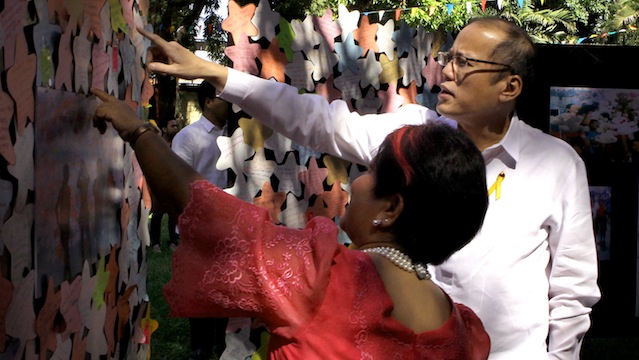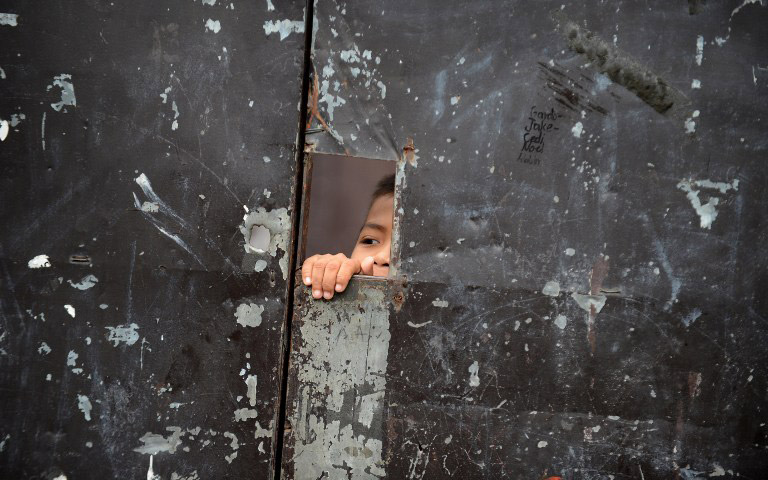SUMMARY
This is AI generated summarization, which may have errors. For context, always refer to the full article.

MANILA, Philippines – The Department of Social Welfare and Development (DSWD) celebrated 63 years of humanitarian assistance and social protection on January 16, with the theme “Kaagapay sa Pagbangon at Bagong Simula.”
The celebration was dedicated to all survivors of calamities.
“In government service, the age of 63 may be a year for optional retirement. In DSWD we refuse to say retire, instead we say continued commitment to serve the vulnerable in a manner that is magiliw, mahusay, matapat, mabilis at matatag,” DSWD Secretary Corazon “Dinky” Soliman said in her opening speech.
Exceptional employees were awarded for their service and commitment. DSWD development partners were also recognized and awarded for their incessant support.
President Benigno Aquino III joined the celebration. He praised DSWD employees who have selflessly and effectively reached out to the survivors of Typhoon Yolanda (Haiyan), and gave out the PANATA Awards (Panata ko sa Bayan or “Pakilala sa Natatanging Kontribusyon sa Bayan”) which recognizes the efforts of individuals, groups, and organizations who vow to share their resouces, talent and time to provide hope to vulnerable sectors.
The President also defended DSWD from critics, saying that the Department never gave up amid any crisis, and instead remained focused on its goals and in helping devastated families. (READ: Aquino to DSWD: Thank you for not giving up amid criticism)
As of 2013, DSWD has provided more than a billion pesos worth of assistance to disaster victims. Efforts were directed towards relief, early recovery, and rehabilitation.
Milestones
The President praised the success of DSWD programs such as the Pantawid Pamilyang Pilipino Program (4Ps), the administration’s flagship poverty-alleviation program, which has assisted around 4 million households.
The program provides cash, education and health assistance to poor families on the condition that their children are enrolled in schools and that they visit health centers for check-ups. The program also assists pregnant women.
Now on its 5th year, 4Ps is being implemented in all 1,627 cities and municipalities in 79 provinces in 17 Regions.
The regular program covers 3,839,259 households, while 94,247 are covered by the Modified Conditional Cash Transfer (MCCT). The MCCT targets Families in Need of Special Protection (FNSP), Homeless Street Families (HSF), and Extended Age Coverage Program (EAP) for children 15-17 years old.
The department also prioritized programs focusing on community development. The Kapit-Bisig Laban sa Kahirapan-Comprehensive and Integrated Delivery of Social Services (Kalahi-CIDSS) aims to reduce poverty by funding community projects.
Kalahi-CIDSS has covered 48 poorest provinces in the country.
Mandate
The Sustainable Livelihood Program (SLP) provides entrepreneurial and employment opportunities to the poor. A total of 12,329 households were provided employment.
As part of its mandate, DSWD ensures that all of its targeted sectors are assisted, this includes the elderly and disabled. The Social Pension for Indigent Senior Citizens provides a monthly P500 stipend to over 254,175 beneficiaries.
DSWD also conducts feeding programs for children enrolled in day care centers. The program is managed by parents based on a prepared meal plan which uses available indigenous food supplies. The children are weighed before and after the 120 feeding days to check their nutritional status.
The department, in partnership with local government units (LGUs), provides financial and technical support to street children and street families.
As of 2013, around 1,087 street children received educational assistance. Meanwhile, 214 families underwent skills training and 200 street adults were given cash-for-work assistance. They worked as sweepers, park patrol, or greeters and received P303/day.
DSWD, in coordination with the Department of Justice (DOJ), also provides programs for the psychosocial, social and economic needs of victims of trafficking.
The services include financial assistance, skills training, capital assistance, referral to employers or business partners, board and lodging, documentation, DNA testing, and temporary shelters.
Another priority is the housing program for informal settlers. The program seeks to benefit 16,695 families validated as informal settlers. As of December, 1,232 families have been resettled.

Goals for 2014
DSWD plans to expand and improve its poverty-reduction programs.
4Ps will continue to cover all eligible poor households. Beneficiaries who have graduated from the program will be given access to other services such as sustainable livelihood opportunities.
Kalahi-CIDSS will cover an additional 323,325 households nationwide. The program will also prioritize environmental protection.
DSWD hopes to reduce the number of street children and street families by 80% in highly urbanized cities. Efforts towards helping victims of trafficking will be strengthened and food supplementation will be given to 2,006,549 children in day care centers.
DSWD will also expand the Social Pension for indigent senior citizens to cover additional 46,954 beneficiaries. The age requirement will be lowered from 77 to 70 years old.
Shelter assistance will hopefully be provided to 472 informal settler families living in dangerous areas and waterways of Metro Manila.
The department will also evaluate and enhance its disaster risk reduction strategies, programs, services and partnerships for 2014.
“Much still needs to be accomplished, but with you our partners by our side, I trust that the disadvantaged, marginalized and vulnerable sectors will soon rise from their situation, as we all journey towards inclusive development,” Soliman said. – Rappler.com
Add a comment
How does this make you feel?
There are no comments yet. Add your comment to start the conversation.